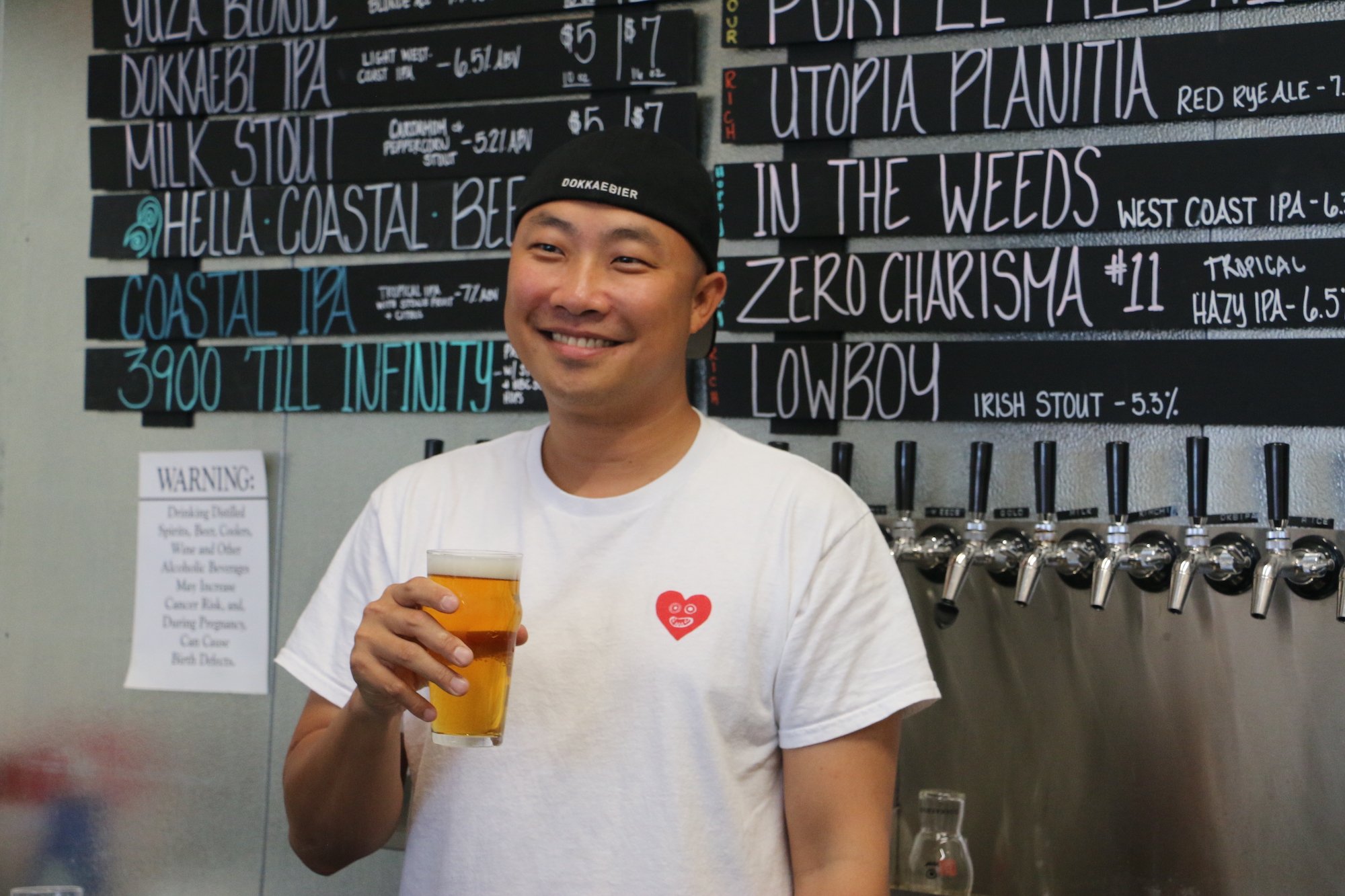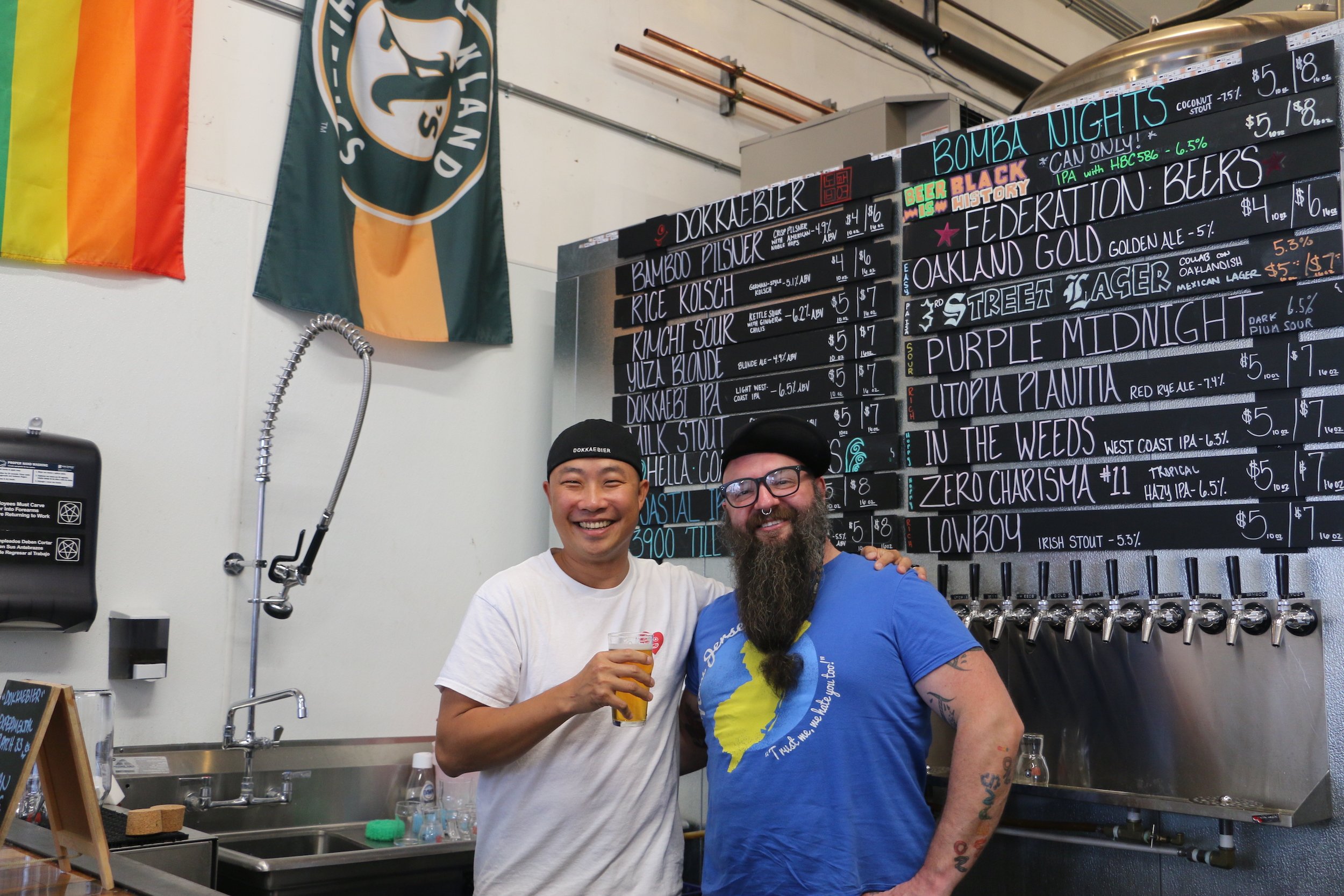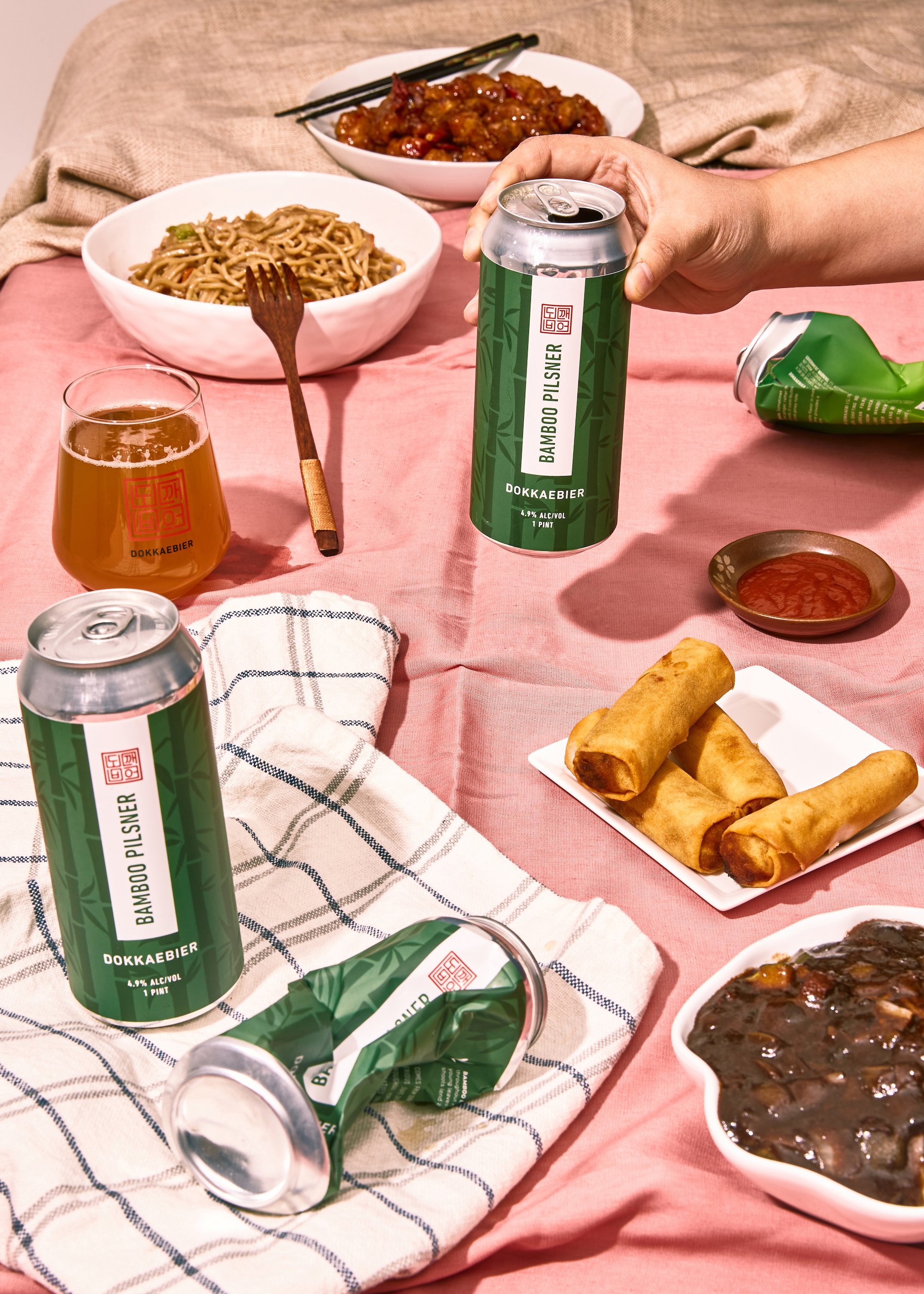Why the Future Looks Bright for Korean Inspired Craft Brewery Dokkaebier
Youngwon Lee in his new taproom photo credit Gail Ann Williams
In early April, 34-year-old Youngwon Lee, the energetic founder of Dokkaebier Brewing Co., announced the acquisition of Federation Brewing Co., a craft brewery in the Jack London Square “brewery district” of Oakland, CA. The move shined a light on a 3-year-old brewery with ambitious plans and deepening roots in its multicultural community.
Dokkaebier: A Korean Inspired Brewery
Lee and Weshnak photo credit Gail Ann Williams
Lee says he founded Dokkaebier to bring new flavors to the table, confident of the experimental approach his company would adopt based on his unique personal journey. A Korean immigrant who arrived in the states as a small child and grew up American, he returned to spend time in Korea as a young adult, importing California wines and a range of top shelf liquor brands. Eventually he was involved in opening a restaurant bar there as well. When he returned to California, Lee shifted his focus to craft beer, working for a Korean-owned brewery startup in Eureka, CA., called The Booth. He became friends with head brewer Aaron Weshnak.
When The Booth ceased production, Lee began thinking about putting together his own brewery, determined to approach the market differently. He recalls the experience of pouring with a coworker at beer festivals around California and repeatedly commenting on their experience of being the only two Asian Americans in attendance. Where were their peers?
“I saw the opportunity to be more Asian with my brand. And now we’re living in a century where it’s actually cool to be authentic to who we are, compared to when I grew up and it was less cool,” Lee smiled, remembering his childhood in the suburbs of New Jersey.
He decided that the name of his new brewery, its logo and many of its recipes would be Korean-inspired. Lee reached out to Jiah Park, a woman he’d worked with in Korea, to develop Dokkaebier’s branding, designs, and artwork remotely. He brought Weshnak aboard with an assignment to create beers exploring Asian flavors and refining them based on customer feedback. Naming was the hardest initial task, but eventually Lee’s wife suggested the name of playful Korean folklore spirits, shape-shifters called “dokkaebi.” He played on the classic German spelling of “bier” to conjure a multicultural pun for a brewery that would itself begin by shape-shifting into the brewing layout of whichever good local production facility could faithfully execute its new recipes under contract.
Born in Strange Times
Now pouring in their own taproom glassware photo courtesy of Dokkaebier
Dokkaebier launched in February 2020 in time for SF Beer Week at a pop-up space in San Francisco. But coming out of the COVID-19 lockdown months later as an unknown brewery, still making beer at a series of small breweries around the Bay Area while delivering orders door to door in his own car, the lack of a location where people could finally come in to try the beers had become the major business hurdle. Lee turned to the gradually re-emerging beer festival circuit as the only place where new customers could gather to try samples.
One milestone was his presence at a festival in LA where Lee says Dokkaebier attracted the longest lines. A beer fan approached him, expressing his strong desire to learn to be a craft brewer while respecting his own Korean heritage. Lee invited Justin Cho to work for Dokkaebier, but in another capacity. When Cho moved from LA to Oakland, he was surprised to discover that the small company was still doing business out of Lee’s home. Cho dove into sales, delivery, and whatever was needed. He looks forward to learning to brew now that experimental brewing will be hands-on in their own space.
Lee recognised the significance of providing opportunities to people like Cho who might not otherwise reach out to apply to a brewery. “I could make more of a contribution to the industry than just bringing a product to market,” he mused. Diversity, equity, and inclusion became a key part of the brewery’s mission and identity.
Synergy and Symbiosis
While serving on the DEI committee of the Bay Area Brewers Guild, Lee got to know the African American founders of Oakland’s Hella Coastal Brewing. When he began confidential conversations with Federation Brewing Co. late in 2022, Hella Coastal was sharing Federation’s 15 barrel production facilities and taproom via an arrangement known as an alternating proprietorship, where a license for fermentation is legally transferred back and forth between two brewing companies so they can split the production capacity of a facility. While Lee could not tell them about what was in the works until the deal was finalized, he looked forward to be able to work with them at the taproom as Federation had, continuing to schedule days devoted to brewing Hella Coastal beers.
Federation Brewing, founded in 2014, had long focused on helping others get into the beer industry, including the arrangement with Hella Coastal, Oakland’s only Black- owned brewery, and collaborations with Brewing with Brothas, now in planning to be East Palo Alto’s first brewery.
“Dokkaebier shares our commitment to advancing diversity, equity and inclusion in the beer industry and will help extend our legacy as a community-oriented brewery,” said Federation Brewing Co-Founder Aram Cretan in the announcement of the sale of his brewery.
Lee is pleased that Hella Coastal will continue brewing in the space along with Dokkaebier experimental brews. The taproom will continue to be a space to shine a light on the movement toward increased diversity in the craft beer community. The Federation team is staying on with the new company, and Federation beers will remain on the menu along with Dokkaebier and Hella Coastal offerings.
However, while Dokkaebier’s experimental batches will now be brewed onsite, production of the Dokkaebier core brands will not move to Oakland. A growing volume will be needed, both as the taproom finds its fans and in order to move into additional markets envisioned outside of California. Lee is looking at Nevada and Oregon, to be followed by other states. Currently, Heretic Brewing Co. is brewing and packaging 60 barrel batches for Dokkaebier in Fairfield, California. While so far the company is so small that they declined to comment on last years production totals, Lee expects that sometime this summer 120 barrel batches will be required to keep up with projected demand.
The Philosophy of the Core Beers
Kimchi Sour photo courtesy of Dokkaebier
The company has settled on 5 core offerings, each of which feature subtle use of Asian-inspired additions to craft beer recipes. The most Korean sounding beer is the Dokkaebier Kimchi Sour, which is a major attraction at beer festivals. Unlike actual kimchi, the beer avoids any fermented garlic or cabbage notes. It’s a tart ale soured with a lactic culture derived from homemade kimchi and flavored with a touch of two other kimchi superstars, ginger and gochugaru peppers.
Bamboo Pilsner photo courtesy of Dokkaebier
There are 3 bright, clean beers in the core lineup: Yuza Blonde (brewed with yuza, the flavorful citrus known in Japan as yuzu), Rice Kolsch (offering an impression of toasted rice), and Bamboo Pilsner (made with grassy green-tea-like bamboo tea and American noble hops).
Dokkaebier Milk Stout, inspired by the flavors of Indian Chai, rounds out the lineup with touches of cardamom and peppercorn infused into a milk stout with restrained lactose sweetness.
In addition to his goal of reaching more current craft beer consumers, Lee is tantalized by the potential to get his beers into restaurants that currently only offer international light lagers. “If you go into a Chinese or Korean restaurant, you find a Budweiser-like version of Asian beer, but you don’t have any option to upgrade to craft beer,” he explains. “I think it makes sense for those restaurants to also offer Asian inspired craft beer.”
Dokkaebier in Germany?
During Lee’s relentless fundraising to enable getting a taproom and starting wider distribution, the brewery solicited investors via a crowdfunding site. While Lee particularly treasures the testimonies of those who invested small amounts because they believe in the vision, he also attracted beverage industry entrepreneurs Hayden Fulstone and Avery Glasser.
Glasser, who lives in Munich, Germany, is now onboard as the director of strategy and new markets. He wants to bring Dokkaebier to locations across the U.S. by the end of 2024. And he wants to be able to enjoy a glass in Munich as well.
While serving Asian-inspired American craft beers in the birthplace of Oktoberfest is an unusual aspiration, the project is underway, despite the Reinheitsgebot “beer purity” traditions that may make it impossible to call a craft beer made in California a “rice kolsch” or perhaps even a beer at all. Dokkaebier has set out to navigate the regulations and labeling. When and if the cans arrive, it will be up to curious beer drinkers to decide what is authentic and tasty.





